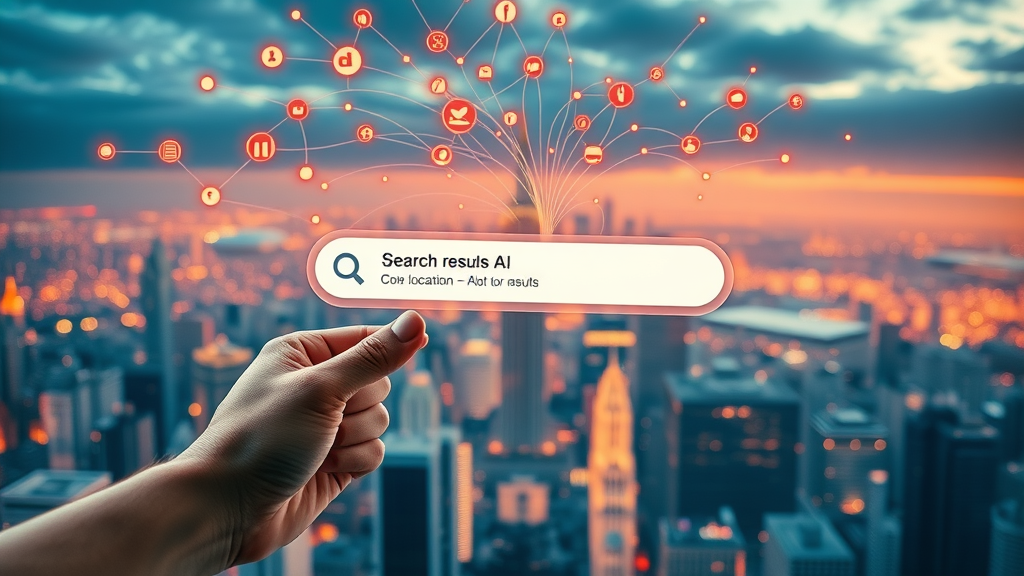Did you know that over 90% of online interactions begin with a search? Today, AI local search and smart search algorithms decide which results you see first—making your website’s structure more important than ever for standing out locally. From how artificial intelligence sorts and ranks local businesses to why structured data is key for visibility, this guide will show you the essentials of dominating your local market with the right digital moves.
AI Local Search is Shaping the Future: Uncovering the Surprising Reach of Search Algorithms
- Startling fact: Over 90% of online interactions begin with a search, and advanced AI local search algorithms now determine what results users see. This new era demands that businesses and website owners structure their sites for optimal AI visibility.

- In this guide, you'll learn how AI impacts local search, why search algorithms matter for your business, and practical steps to structure your website for elevated local visibility.
What You Will Gain When You Master AI Local Search Optimization
- Deep understanding of modern search algorithms and local search algorithms
- How machine learning powers AI local search
- Website structuring best practices to align with local search algorithm priorities
- Practical steps to enhance your site's local search presence

Understanding AI Local Search and Search Algorithms
Defining AI Local Search
- AI local search uses artificial intelligence and machine learning to make local search results smarter and more relevant for every user. Instead of matching websites solely by keywords, AI analyzes behavior, context, reviews, and even the exact location of a user, ensuring people see what’s most useful and close to them.
- For example, if you search for “coffee shop,” AI local search algorithms aren’t just showing the most popular café—they’re factoring in your location, shop ratings, busy times, and even personal preferences. The search engine now acts almost like a personalized assistant. This makes a huge difference for businesses: sites with structured and up-to-date information show up more often and in better positions.

Search Algorithms in Local Search: The Backbone of AI Optimization
- At its core, a search algorithm is a program that sorts, ranks, and presents answers to search queries. When applied to local search , these algorithms go further by focusing on your geographical region, using local search algorithms designed for location-based results. This includes older, rule-based methods and today’s advanced approaches powered by AI and machine learning .
- Local search algorithms play a vital role in AI optimization. They ensure the most accurate and locally relevant results are shown, quickly filtering through a vast search space of businesses, websites, maps, and reviews. As these algorithms become more sophisticated, your website’s structure and the details it communicates have never been more critical.
How AI Local Search Algorithms Function: An In-depth Exploration
The Role of Machine Learning in AI Local Search
- Machine learning acts as the powerhouse behind modern AI local search algorithms. By analyzing millions of searches, user actions, and business listings, these smart systems detect patterns that help improve results for people in specific locations.
- Unlike static algorithms, machine learning lets the search engine respond in real time—constantly adapting to changes in user behavior, new businesses, and even subtle marketing shifts. For example, if a popular local restaurant suddenly gets many positive reviews and searches, AI will boost its position sooner. This ongoing, data-driven learning process is why websites must stay fresh and correctly organized for the best local visibility.
Types of Local Search Algorithms Used by AI
- Several types of local search algorithms help AI solve location-based optimization problems . Key types include:
- Hill climbing : Searches for better results by making small changes step by step, always moving toward improved visibility. It’s fast, but can get stuck in local optima , missing better results further away in the solution space .
- Simulated annealing : Inspired by metal-cooling processes, this approach sometimes accepts less-optimal solutions for the chance of overcoming local optima . It explores more broadly, helping AI find the overall best answers.
- Tabu search : Keeps a short-term memory to avoid cycling over the same answers repeatedly. This modern algorithm increases variety, which is especially useful when you have many equally strong local competitors.
- Beam search and local beam search : These scan multiple candidate options at once, excellent for narrowing complex keyword clusters or tackling the so-called salesman problem where you must find the best route or order for displaying results.
- These different search algorithms give AI the flexibility and power to sort the vast world of local business listings in exciting and increasingly accurate ways.
How AI Identifies Location-Specific Information
- AI uses local search algorithms and advanced data extraction to scan for and understand location-based details across websites. The search engine looks for things like business addresses, city-page keywords, structured reviews, and NAP (Name, Address, Phone) consistency. All these elements are weighted by their accuracy and relevance.
- As part of its evaluation, AI gathers data from directories, customer feedback, citations, and even social profiles. It uses these factors as signals to choose which local businesses rank highest and appear on search engine results pages. For your business, making this information clear and organized on your website will directly improve your local search presence.
"With refined AI local search, your business listing isn’t just found—it’s chosen."
The Power of Structured Websites in AI Local Search Optimization
Why Structured Data is Essential for Local SEO and AI Visibility
- Structured data is the secret language that AI understands best. When you use schema markup (like LocalBusiness or Organization schemas), search algorithms and AI can instantly identify what your site is about, your location, and how trustworthy your data is. This helps boost rankings and ensures you’re shown to the right local audiences.
- NAP consistency (making sure your Name, Address, and Phone number are the same everywhere), and well-structured local content are also critical. They anchor your business for the algorithm, making it easier for search engines to recognize, rank, and feature your business in location-specific results.
Practical Website Structuring Tips for AI Local Search
- Use location-specific keywords and metadata: Make sure your city, region, or neighborhood is included in page titles, headings, meta descriptions, and image tags.
- Optimize internal linking with local focus: Link to local landing pages, blog posts, or location-specific sections to build strong connection signals for the search engine.
- Implement structured data using relevant schema types: Use LocalBusiness, Place, and Organization schema markup to give AI all the details it needs.
- Prioritize mobile and voice search optimization: With more searches on smartphones and smart speakers, mobile-friendly pages, fast load times, and clear spoken language are must-haves.

Major Local Search Algorithms and Their Roles
| Local Search Algorithm | Use Case | Pros | Cons |
|---|---|---|---|
| Hill Climbing | Local SEO ranking adjustments | Fast results | Can get stuck in local optima |
| Simulated Annealing | Overcoming local optima | Explores broadly | Slower convergence |
| Tabu Search | Avoiding repeated results | Finds diverse solutions | Complexity |
| Beam Search | Keyword cluster optimization | Efficient on large data | Risk of missing best answer |
| Local Beam | Hyper-local targeting | Focused | Narrow scope |
How AI Local Search Impacts Search Engines and Ranking: Google, Bing, and Beyond
Google Search Algorithm Updates and AI Integration
- Google’s search algorithm has recently undergone major changes as it integrates more AI into every update. Now, the search engine uses AI to better interpret search intent, identify location-specfic details, and balance fresh data against trustworthiness and relevance. This means a minor address tweak on your website, or even a surge in online reviews, can quickly influence your ranking in real-time.
- With AI-driven updates like Google's Search Generative Experience (SGE), search algorithms gain an even deeper understanding of context, helping local businesses connect with nearby customers faster than ever. It’s a game-changer—requiring websites to be structured, error-free, and packed with relevant, accurate details for every location.

Other Major Search Engines and Their Local AI Implementations
- While Google leads the way, Bing uses AI-powered local search algorithms to highlight businesses based on proximity, popularity, and data quality. Yahoo , DuckDuckGo , and emerging search engines prioritize privacy and contextual signals, often giving preference to sites with trustworthy, well-structured data.
- Across all of these platforms, the lesson is clear: AI local search rewards businesses that provide complete, structured, and accurate information, ensuring better visibility across the digital landscape.
Key Concepts: Stuck in Local Optima and Overcoming Common AI Local Search Challenges
Understanding Local Optima in Search Algorithms
- In search algorithms , a “ local optima ” is when an algorithm finds a “good enough” solution, but misses the absolute best result buried deeper in the solution space . For businesses, this means you might rank well in your neighborhood, but never reach city-wide prominence because the AI gets “stuck” with your current site as the best option found so far.
- Modern AI local search algorithms—from simulated annealing to tabu search —are designed to break out of this trap. They use randomness, memory, and dynamic adjustments to find better solutions for local search visibility, helping your business reach new peaks.

Real-World Examples: When Websites Suffer or Succeed with AI Local Search
- Businesses with outdated or inconsistent information often struggle—or get stuck in local optima —in local search. For instance, a restaurant that hasn’t updated its menu, hours, or NAP data could drop in search results or get overlooked by AI-driven ranking updates entirely.
- In contrast, sites that regularly update their content, maintain NAP consistency across directories, apply structured data, and solicit positive reviews tend to soar in AI local search results—even after major search algorithm overhauls. The difference is often night and day, especially for businesses competing in crowded local markets.
Step-by-Step Guide: Structuring Your Website for AI Local Search Dominance
- Audit your existing website using AI local search and local search algorithms criteria
- Implement schema markup (localBusiness, organization, etc.)
- Strengthen local SEO with reviews, testimonials, and up-to-date contact info
- Create specialized landing pages for each location served
- Build strong citations across trusted business directories

AI Local Search Strategies for Different Business Types
Brick-and-Mortar Stores vs. Online Service Providers
- For brick-and-mortar stores , AI local search and local search algorithms emphasize physical proximity, accurate maps, hours, and in-person reviews. Structuring your site to highlight your location, offer directions, and showcase local events is essential.
- By contrast, online service providers (like remote consultants or e-commerce) need strategies that highlight service areas, digital reviews, and perhaps city or region-based landing pages. Here, search algorithms look for expertise, location signals, and digital proof that you serve a given area.

Case Study: Multi-location Businesses and the Local Search Algorithm
- Major franchises and chains are winning at AI local search by giving each location its own unique, structured page—complete with schema markup, local reviews, up-to-date info, and strong local signals (think Google Business Profile, Yelp, etc.).
- For example, a multi-location dental practice implements NAP consistency across hundreds of pages, generates real reviews for each office, and links these locations with internal and external citations. The result? High rankings for each city served, increased traffic, and exponential growth.
The Future of AI Local Search: Trends, Predictions, and Emerging Technologies
- Emergence of generative AI in local search: AI chatbots and language models are creating richer, more conversational local results—changing how people interact with search engines.
- Voice search impact on AI local search algorithms: As searches become shorter and more conversational (“Where’s the closest pizza shop?”), structured, natural language on your website is increasingly vital.
- Geo-personalization and hyper-local targeting trends: AI now delivers results tailored not just to a city, but to neighborhoods, streets, and real-time contexts, letting local businesses connect with the most relevant customers.
Answers to Key Questions on AI Local Search and Algorithms
What are local searches in AI?
- Local searches in AI mean using algorithms and artificial intelligence to find the best results within a certain area or context, like your city or neighborhood. These processes are why searches for “pizza near me” or “best plumber in [town]” work so well.
How do I turn on Google AI Generative Search?
- To enable Google AI Generative Search (SGE), join the Search Labs program through your Google account and activate the AI search experience in your settings. You'll get early access to advanced, AI-enhanced search results and features.
Are there any local AI?
- Yes, there are local AI tools—like custom chatbots, smart virtual assistants, and AI-powered business dashboards. These help you analyze, optimize, and even automate parts of your local search and digital marketing.
Can I use AI to search?
- Absolutely! AI-powered search engines and apps find more relevant, faster, and personalized results for any type of search, including local queries—making AI a must for both users and business owners.
Frequently Asked Questions About AI Local Search and Search Algorithms
-
How does AI local search differ from traditional search algorithms?
AI local search uses machine learning and context-awareness to understand user intent and local data. Traditional search algorithms are more rule-based and less personalized. -
What are the best practices for local SEO in AI-powered search?
Use structured data, keep your NAP consistent, create unique local landing pages, gather real reviews, and update your information regularly across all platforms. -
Can AI-powered search algorithms penalize poor website structure?
Yes. Sites with missing or inconsistent data, faulty schema, or outdated info often drop in rankings or are missed by AI entirely. -
How often do search engines update AI local search algorithms?
Google and other major engines update their AI and local search algorithms frequently—sometimes several times a year or even monthly.
Essential Local Search Algorithm Terms You Need to Know
- Search algorithm: A program that sorts, ranks, and displays results
- Local search algorithm: An algorithm that factors in geographic relevance
- Machine learning: AI technique for data-driven search improvements
- Hill climbing, simulated annealing, tabu search: Optimization algorithms commonly used in AI
- Local optima: Trap where an algorithm finds a 'good enough' solution but fails to locate the best one
Expert Insights: Quotes from AI Local Search Authorities
"Structured data is the language AI understands best when it comes to local search." — Search Engine Journal
"AI-powered local search is now the single greatest factor determining online visibility for small businesses." — Moz Analyst
Action Plan: Start Optimizing Your Website for AI Local Search Today
- Regularly update your business information on your website and directories
- Adopt schema markup for every location
- Monitor local search rankings using AI tools
- Stay ahead with local search algorithm trends
Summary and Next Steps for AI Local Search Success
- AI local search is a rapidly evolving field with a direct impact on business visibility.
- Structured website data is the foundation for AI local search dominance.
- Ongoing adaptation to new search algorithms is required to maintain visibility.
Discover More and Take the Lead in AI Local Search Optimization
- Implement these strategies today to get ahead in AI-powered local search.
- Contact an SEO professional for a customized audit.
- Subscribe for the latest AI local search trends and updates.
Take action now: Make your website the top choice for AI-driven local search results—start optimizing, monitoring, and adapting today!
To deepen your understanding of AI’s role in local search and the importance of website structure, consider exploring the following resources:
-
“Local Search Algorithm in Artificial Intelligence” : This article provides an in-depth look at various local search algorithms, such as Hill-Climbing, Simulated Annealing, and Tabu Search, explaining their applications and significance in AI-driven local search optimization. ( geeksforgeeks.org )
-
“Enhancing Local Search with AI: A Practical Guide” : This guide discusses how AI can be leveraged to create localized content that resonates with specific audiences, emphasizing the role of AI in analyzing local search data to identify trending topics and keywords. ( lean-seo.com )
By delving into these resources, you’ll gain valuable insights into the mechanics of AI in local search and practical strategies for optimizing your website’s structure to improve local search visibility.
 Add Row
Add Row  Add
Add 



Write A Comment